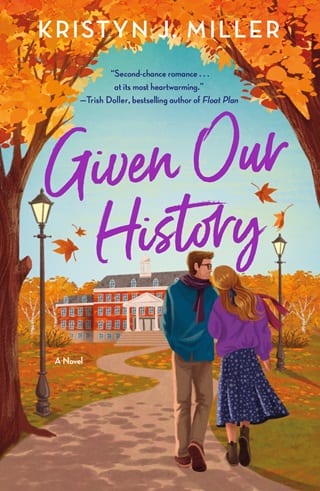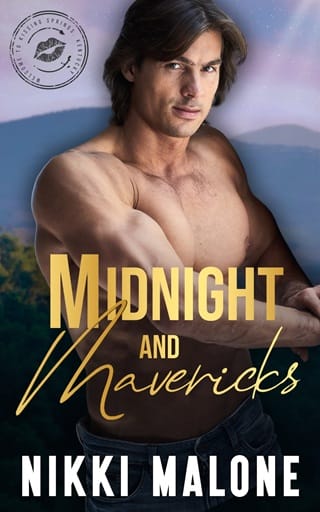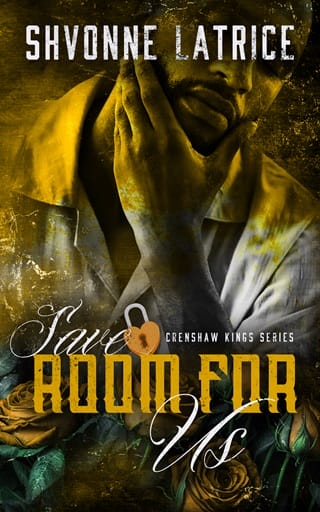Chapter 3
CHAPTER
3
SEVENTEEN YEARS AGO
Rain hammered against the tin roof of our cabin, dashing any lingering hopes of playing volleyball or capture the flag today—or the rest of our first week, if our new cabin leader was to be believed. Miss Andrews had parked herself in front of an old television the size of a shoe box in the girls’ common room, watching The Office. There was little to entertain the rest of us, at least not cooped up like this, which left us with one option: braving the storm.
I stood beside the door with Isabel Santos, my cabinmate from the previous summer. She’d grown a couple inches since the last time I saw her, bony ankles poking out from a pair of brown gauchos. “Ready?” she asked, shrugging her lanky arms out of her faded Hollister hoodie so that she could canopy it over both of us.
“Let’s do it.” I ducked beneath the hoodie and we charged out into the gray downpour, squealing in unison when it pattered against our heads.
We sprinted for the cafeteria. The ground was wet and sloshy, rivulets cutting between the cabins, splattering the white off-brand Converse I’d begged Mom to buy me the month be fore, but what choice did I have? It wasn’t like this last year. Last year it was muggy most of September, hot enough that the camp counselors gave up on wrangling us for educational activities like bird-watching and gardening and instead let us spend most of our time swimming in the lake and pummeling each other with dodgeballs. Socialization is key to childhood development, Mom had told me when she first enrolled me in Appalachian Adventure Camp the previous autumn. That was the real reason we were all here—everyone assumed homeschooled kids couldn’t possibly get enough socialization at home, so the solution was to throw us in a bunch of cabins together and hope we all turned out all right.
But there wasn’t much socialization going on in that stuffy cabin, and I planned to tell Mom exactly that when she asked why my shoes were muddy.
We slipped into the cafeteria in a flurry of laughter, the rain chasing us inside. The scent of warm, dry pine clung to the air, and knotty exposed beams crisscrossed over our heads. Izzy went to hang her now-soaked hoodie on the coatrack near the old gas radiator, her wet hair sticking to her cheeks in slick black tentacles. I stomped my shoes clean on the mat so that the lunch lady wouldn’t yell at us, but the lunch lady was nowhere to be seen. Lunch ended hours ago, and dinner wasn’t until seven o’clock, so the cafeteria was empty except for a group from the boys’ cabins, huddled around a table where they were playing one of those card games like Yu-Gi-Oh! or Magic: The Gathering. Heads turned and necks craned at our arrival, but they quickly determined that we weren’t anyone of interest.
“Where are the games?” Izzy asked.
I gestured toward the pine cabinet on the far wall, one of its doors permanently ajar because the hinges were bent. “I saw one of the older girls get them out after dinner the other night.” Inside was a treasure trove of board games: Yahtzee and Life and an edition of Mall Madness that had probably been wedged back in there since the nineties—all games I wasn’t allowed to play at home because my parents didn’t think they were educational enough.
We were in the middle of a heated debate about Mall Madness versus Guess Who? when shouts and pitchy laughter erupted from the boys behind us. Both of us whipped around. Their heads were all bowed around the table, oblivious to our presence.
Izzy exhaled, peeling a tendril of damp hair from her face and tucking it behind her ear as we turned back to the cabinet. We settled on playing Guess Who? first, but with the condition that I owed Izzy a game of Mall Madness. We were barely at our table for five minutes before a boy with a mess of ink-black hair broke off from the rest of the group and swaggered over to us. He was the size of a fourth grader and dressed in cargo pants and a severely oversized Alaska sweatshirt that might’ve been hand-me-down, but he slid into the chair beside Izzy like he was a celebrity gracing us with his presence.
Mohammad Darvish, Izzy’s sworn rival in all things camp-related. Last year she had beaned him so hard with a dodgeball it gave him a black eye, but he kept on taunting her anyway.
“Guess Who? is lame,” he announced to no one in particular.
Izzy didn’t spare him a second glance. “You’re lame, Darvish.”
“Seriously, it’s a silly kids’ game. Just look at the cartoony way they drew all the faces.”
She rolled her eyes so hard they threatened to get stuck. “You’d know all about kids’ games, since that’s probably all you play.”
“No way. Back at home, my family plays trivia every game night. I’m pretty good at it. We watch Jeopardy! all the time and I always know the answers. Because I’m an intellectual,” he emphasized when neither of us showed any signs of interest.
“Trivia doesn’t prove you’re smart,” Izzy shot back. “It’s just random facts.”
“You’re only saying that because you prefer stupid games like Guess Who?”
I dragged a hand over my face. This kid was annoying the heck out of me. “Izzy could beat you at trivia any day,” I said. “Right now, in fact.” A quick glance at Izzy—at the slight widening of her eyes, the almost imperceptible shake of her head—told me that she didn’t actually believe she could beat him, so I hurried to add, “Let’s play teams. Our team against yours. Then we’ll see who the real intellectuals are.”
Darvish frowned and glanced at his raucous friends. “There’s only two of you. That’s not even a fair match.”
“Two on two, then,” I suggested. “Pick whichever of your friends is best at trivia.”
Izzy’s eyes looked like they might pop out of her head. She was going to kill me later, but that didn’t matter right now. Darvish was wrong and I was going to prove it.
He seemed to mull things over for a minute, then his mouth quirked in a cocky smile. “You’re on.” But rather than call one of his friends to join us, he popped out of his chair, remembering to toss an explanation over his shoulder only when he was already halfway out the door: “I’ll be back in five minutes. I expect the game to be set up by the time I get back.”
I looked to Izzy for an explanation, but she was too busy plotting my murder. “Why’d you tell him we can beat him?”
“Because we can.” I went to fetch Trivial Pursuit from the cupboard. “My parents don’t even let me play games like Guess Who? at home,” I explained as I settled back at the table and began setting up the board. “I’m really good at trivia. Trust me, we can beat him, no problem.”
By the way she was frowning, it was safe to say Izzy wasn’t convinced, but she’d see soon enough. Darvish obviously had an overinflated ego and I was way too happy to knock him down a few pegs. We had this one in the bag.
By the time he returned, his thick hair sopping from the rain, I’d finished setting up. Trailing after him was a boy I hadn’t seen before—a boy who was unlike him in every possible way. Where Darvish was short, his friend was tall and spindly, like he grew too quickly and the rest of his body hadn’t had the chance to catch up. Where Darvish was dressed like somebody’s middle-aged dad, the newcomer was wearing a knit sweater over a collared shirt, like he’d recently escaped boarding school.
And where Darvish was exceptionally obnoxious, I soon discovered that this boy was exceptionally quiet.
I extended a hand across the table once they’d taken their seats. “Clara Fernsby.”
The boy took my hand and gave it one terse, firm shake, but he didn’t bother with a name.
“This is Theodore Harrison the Third,” Darvish supplied, looking even smugger for it.
Oh my god. Maybe he really did escape from boarding school. “Is that your real name?”
Theodore Harrison the Third furrowed his thick eyebrows at me, like he’d never heard such a ridiculous question in his life. His damp brown hair curled up at the ends and his dark eyes were framed by gold-rimmed glasses, a style I’d only ever seen my grandfather wear. “Why do you ask?”
“It just sounds sort of old-fashioned. Like Theodore Roosevelt. King George the Third. You know.” I ended with a lame shrug, because I was getting the distinct impression that he did not know. He was looking at me like I was an insect, wings splayed and pinned to a corkboard for study. “Don’t people call you by a nickname or something?”
“My dad calls me Teddy, sometimes,” he mumbled.
“Teddy it is, then.” I slapped a game piece down in front of him. “You guys are going to be orange. We’re green.”
“But I like red,” Darvish protested.
“It doesn’t matter what you like,” Izzy snapped.
I ignored them, focusing on the far more interesting opponent across from me. I could beat Darvish—I didn’t doubt that for a second. But I didn’t know anything about Teddy. Maybe he was good at trivia. “Now we have to come up with team names.”
Darvish was already rattling off a bunch of team names centered around words I wasn’t allowed to say at home—words we probably weren’t allowed to say at camp, for that matter—but Teddy crossed his arms on the table, a light frown curling his lips. “That’s not part of the rules.” He was soft-spoken, his voice a little deeper than Darvish’s, which gave me the impression he was maybe a little older than the rest of us.
“No,” I agreed. “But my mom says team names are conducive to team cooperation. So Izzy and I will be ‘Queen Equizabeth the First.’” I gave him a self-satisfied smile. He might be the Third, but I was going to be first in this game.
Darvish scoffed. “That’s the most ridiculous name I’ve ever heard.”
Teddy ignored him, squinting at me instead. “All right. Darvish and I will be ‘I Am Smartacus.’”
“Do you like history, then?” I asked.
“I like most subjects.”
I couldn’t help myself. I just kept talking, even when he plainly didn’t care. “But you named your team after a historical figure, like I did. Spartacus, Smartacus.”
“I figured I’d stick with the theme.”
“History is my favorite subject. I’m going to be a teacher.” There was something about being taught at the kitchen table, my math homework indistinguishable from the chicken-scratch monthly budget Mom scrawled on the back of the electricity bill, that gave me a special appreciation for teaching. It wasn’t that my education was lacking, or that my parents weren’t good teachers; my mom had a bachelor’s in early childhood education and my dad was a blue-collar man of few words—but a whole heaping of proverbs—and eager to share the full breadth of his practical knowledge. Which often involved me standing stock-still over the open hood of his white Silverado, my arms sore with the effort of pointing the heavy Maglite at the spark plugs. But I had all this stuff in my head and no one to really share it with.
Teddy gave me a quick, assessing look that somehow managed to make me feel completely and utterly insignificant. Like I was a little girl chasing him around the playground, begging for a kiss. “Are we going to play trivia, or what?”
Warmth crept into my face. “I was just making conversation. You don’t have to be rude.”
His lips parted like he was about to say something, but he didn’t get a chance to say it, because Izzy—probably in an effort to slice through the tension—read off a question about the Beatles, and then proceeded to bicker with Darvish over the answer. Something about Ringo Starr’s eyebrow.
“Sorry,” Teddy mumbled after a long moment. “I didn’t mean to sound rude. I just…” He trailed off, his eyes cast to the game board. “I guess I don’t have a lot of experience talking to—”
“Girls?” I offered.
“People.” The tips of his ears went a bit red, like he was embarrassed to admit it. “I mostly just talk to my parents. And Darvish, but he’s not allowed to have a cell phone, so we really only talk at camp.”
“It sounds like you could use some friends.” When he shot me a reproachful look, I quickly added, “I don’t mean that in a bad way! I just meant—”
“She means you could use some friends that aren’t Darvish,” Izzy translated. “You know, someone with a shred of—”
Darvish cupped his hands around his mouth and made an annoying wah, wah, wah sound, effectively drowning out whatever Izzy was trying to say. She tried to protest, raising her voice and saying something about maturity, but he wah, wahed right over that, too.
“What I was trying to say,” I said to Teddy, doing my best to tune out their squabbling, “is that I could be your friend. If you want.”
I wasn’t entirely sure what made me throw the offer out there. Maybe because it seemed like the nice thing to do. A small frown creased Teddy’s brow. Apparently, he didn’t understand it either. “You barely know me.”
“I’m pretty sure getting to know each other is part of being friends.”
He seemed to mull this over, narrowing his eyes. They crinkled at the corners in a way that made him look contemplative beyond his years, a deeply distrustful old man in a teenaged boy’s body. I pinched my lower lip between my teeth while I waited for his answer.
“All right,” he said finally. Even as he offered me his hand, he seemed wary somehow, like he was already fantasizing about dousing it in hand sanitizer later. “Friends.”
“Friends,” I agreed, and we shook on it.
 Fullepub
Fullepub 



